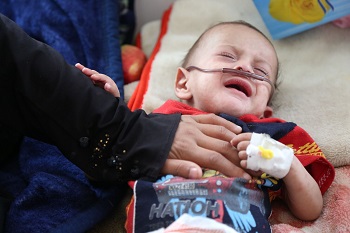One in five children across the Middle East and North Africa needs humanitarian aid
Over 90 per cent are in conflict-affected countries- UNICEF New Analysis
Nearly one in five children across the Middle East and North Africa need immediate humanitarian assistance, according to latest data and analysis. Over 90 per cent of these children live in countries affected by conflict.

A boy suffering from measles receives treatment at Al-Jumhouri Hospital, Sa’ada, Yemen Sa’ada, Yemen, Thursday 21 July 2016.
“Conflict continues to rob millions of girls and boys of their childhood. Decades of progress are at a risk of being reversed across the Middle East and North Africa,” said Geert Cappelaere, UNICEF Regional Director.
Children have been hit hardest by ongoing years of violence, displacement and lack of basic services. Civilian infrastructure, including hospitals, energy, water, sanitation and hygiene installations have often come under attack, exposing children to the risk of death and diseases.
Millions of families were forced to flee their homes – some multiple times and under fire. Continued violence and displacement have increasingly made it difficult for children and families to cope.
“With no end in sight to these conflicts and with families’ dwindling financial resources, many have no choice but to send their children to work or marry their daughters early. The number of children affiliated with the fighting has more than doubled” said Cappelaere.
According to the latest analysis:
• Inside Syria and in refugee hosting countries, almost 12 million Syrian children require humanitarian assistance - up from half a million in 2012. An estimated 2 million children live in hard-to-reach or besieged areas in Syria have received limited humanitarian assistance over the years.
• In Yemen, the fighting has destroyed water and sanitation systems, sparking the world’s worst cholera and acute watery diarrhea outbreak with over 610,000 suspected cases to date. More than half of Yemen’s health facilities are out of service and water systems have been destroyed, cutting off almost 15 million people from safe water and access to basic healthcare.
• Across Iraq, more than 5 million children are in need of assistance as heavy fighting intensified including in Mosul and recently in Tel-Afar. They need water, food and shelter and education.
• In the Gaza Strip, an ongoing electricity crisis has reduced access to water by 30 per cent. Cases of diarrhea among young children have doubled in just three months.
“Children in the Middle East and North Africa region have undergone unprecedented levels of violence and witnessed horrors that no one should witness. If violence and wars continue, the consequences- not only for the region- but for the world as a whole will be dire. World leaders must do much more to put an end to violence for the sake of boys and girls and their future” said Cappelaere.
Source:United Nations Children's Fund
- 261 reads
Human Rights
Ringing FOWPAL’s Peace Bell for the World:Nobel Peace Prize Laureates’ Visions and Actions

Protecting the World’s Cultural Diversity for a Sustainable Future

The Peace Bell Resonates at the 27th Eurasian Economic Summit

Declaration of World Day of the Power of Hope Endorsed by People in 158 Nations

Puppet Show I International Friendship Day 2020

